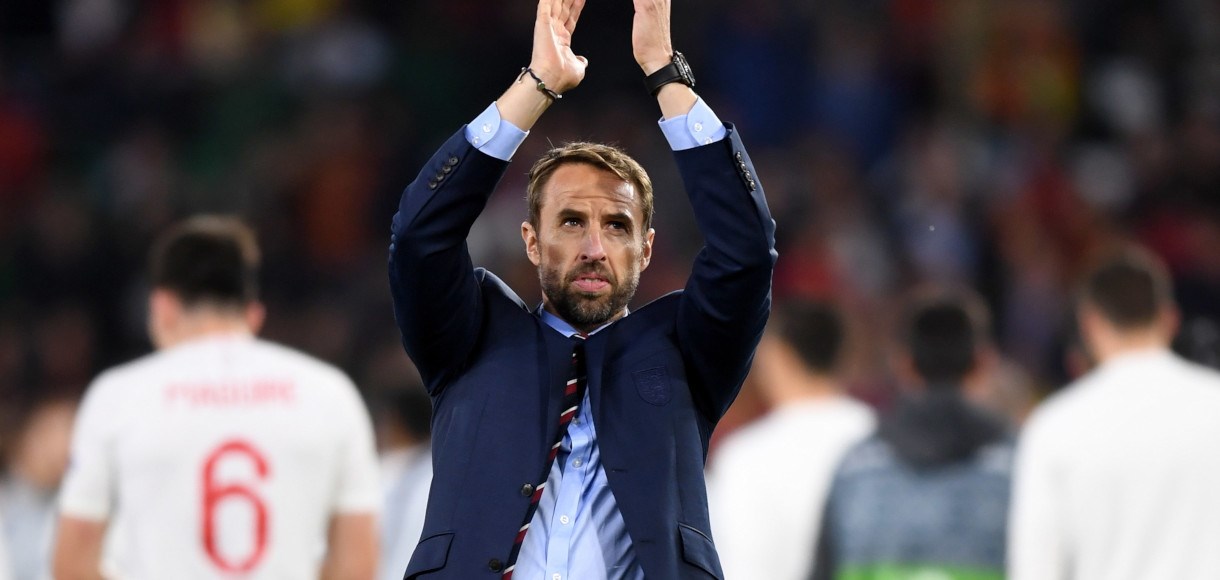4 things Gareth Southgate has got right since the World Cup

Eleven months on from reaching the World Cup semi-final, we assess how Southgate has used the success of 2018 to take England to a new level.
Realised the World Cup wasn’t perfect
Having led England to their semi-finals of the 2018 World Cup and, perhaps more significantly, producing a team that the nation could be proud of, it would have been easy for Southgate to think that he’d cracked it.
But the Three Lions manager was not fooled by what he saw at the tournament and, 11 months on, his side’s playing style, tactics and personnel have been transformed.
He knew that the their failure to attack cohesively in Russia – they had the 10th-fewest shots per game from open play of the 32 teams – reliance on set-pieces and luck of the draw was unsustainable.
So, after the humbling 2-1 defeat to Spain in their first game after the World Cup, the 3-5-2 formation was dropped for a more conventional 4-3-3, allowing room for another attacking player and for Kyle Walker and Raheem Sterling to move into more natural positions.
Sterling’s opener against Czech Republic in March, featuring dreamy one-touch build-up play between Harry Kane and Jadon Sancho, was a victory for the system.
Though only eight of the 23-man Nations League squad is different from last summer’s, the profile of it has changed considerably. Gary Cahill, Ashley Young and Jamie Vardy were discarded as soon as the plane touched down from Russia, with the effervescent Jadon Sancho the most notable new inclusion.
As a result of the joined-up thinking between the age-group teams and senior squad, the team feels fresher than ever.
England’s success last summer was glorious, but Southgate’s continuous improvement means they are poised to meet – and possibly exceed – those expectations in the coming weeks and years.
Embraced the Nations League
Of the few people who fully understood the Nations League last September, even fewer were willing to take it seriously.
But Southgate saw the opportunity to quickly build on the post-World Cup optimism with some competitive victories against other top-ranked sides.
“The idea of a competition where all the best teams are playing against each other was an exciting concept,” he said. “These are really good experiences for the team.”
His outlook set the tone for England, who played with the intensity of a tournament match to inflict home defeat on Spain for the first time in 15 years in October.
They replicated it the next month, part-avenging the World Cup defeat against Croatia with a 2-1 win against the same opposition to top their Nations League group. The atmosphere at Wembley that day was unlike what the home of football has ever seen for a non-tournament victory.
John Stones this week described the “addictive” winning feeling, and compared would-be victory in this competition to winning his first trophy as a player, the 2017 Carabao Cup.
That attitude can be put down to Southgate placing such importance on the competition early on.
Talked up Raheem Sterling
After years of mistreatment from the media and supporters up to and including at the World Cup, Sterling’s international future was unclear at the start of this season. You wouldn’t have blamed him for packing it in.
Perhaps recognising that he may lose one of his top talents for good, Southgate has taken steps to make Sterling feel a valued member of the England team again.
Changing the system so that he plays in a natural wide position rather than as a second striker was imperative. Sterling has been given the best chance to replicate his club form, and is emphatically doing so.
The 24-year-old also replaced Ashley Young in England’s ‘leadership group’ after the World Cup, reinforcing his significance in the dressing room. As a result, Southgate’s “outstanding role model” could captain the team against Holland on Thursday.
Six goals in five games in the 2018/19 season, compared to two in 45 beforehand, is some reward for his manager’s loyalty.
Dealt with wider issues
Southgate acknowledged that, as “a middle-aged white guy”, he was not the best person to talk about racism after his players were the victim of taunts in Montenegro in March.
But while the description fits the vast majority of all previous England managers, Southgate’s self-awareness is unique.
Steve McClaren, Fabio Capello and Roy Hodgson were all, after well-intentioned starts, chewed up and spat out by the job, with their final days defined by irritability and stubbornness.
Southgate, by contrast, has blossomed. His biggest PR error, when he described Wilfried Zaha as lacking “inherent desire” when choosing to represent Ivory Coast, was in the first few months of his tenure. You sense he wouldn’t make it now.
The England boss was reportedly devastated in the dressing room after that game in Montenegro, something it is hard to imagine of some of his predecessors after a 5-1 win.
Confidently voicing his compassion – helped, admittedly, by the support he has garnered as a result of some good results – is not only beneficial for the team, but ensures England finally have a manager who understands the diverse nation he represents.
Visit Betway's football betting page.




































